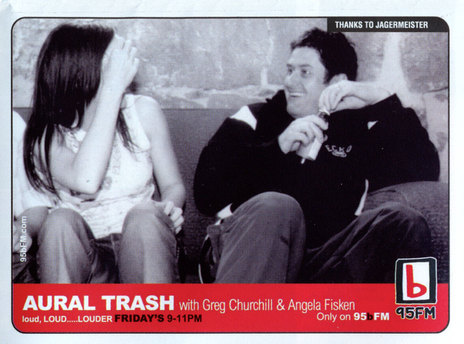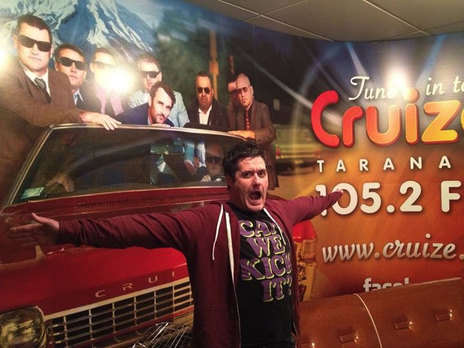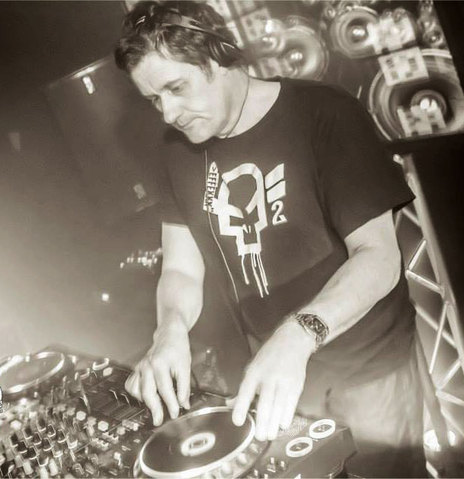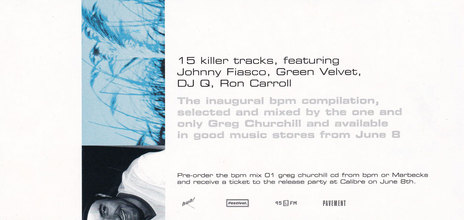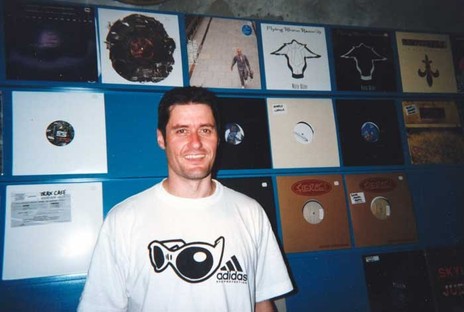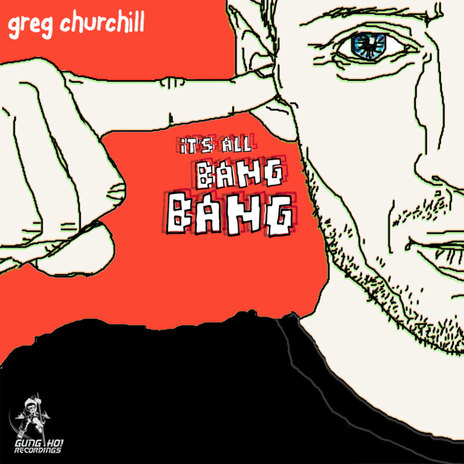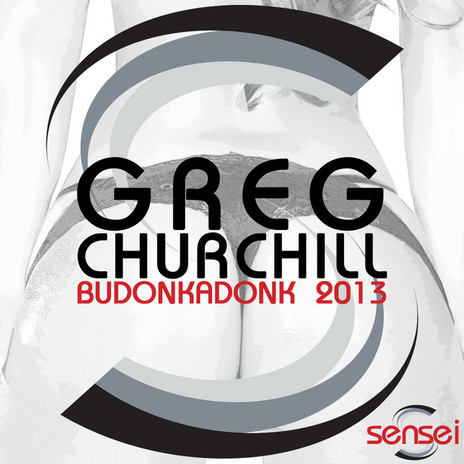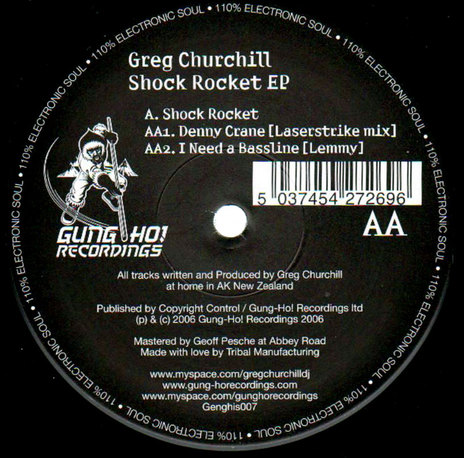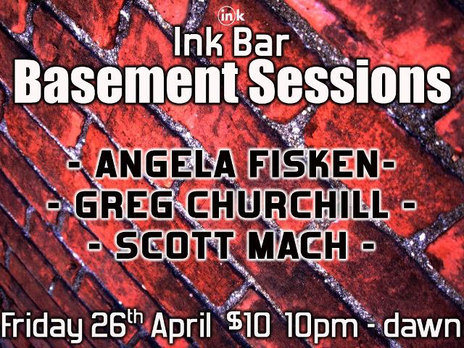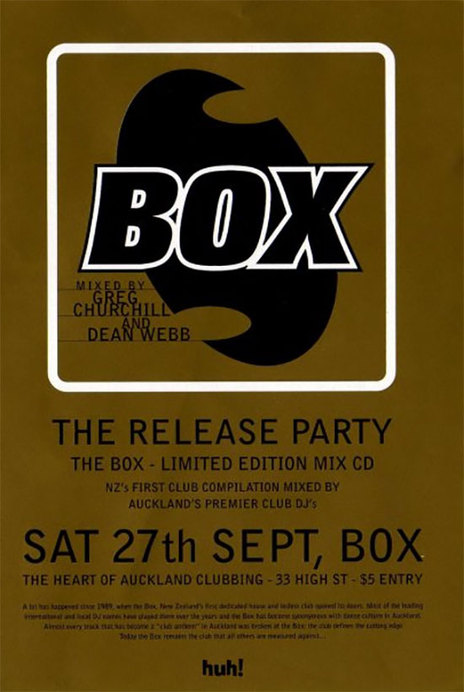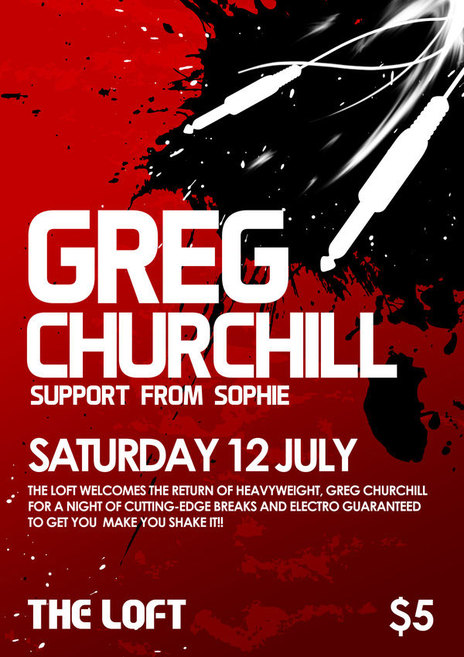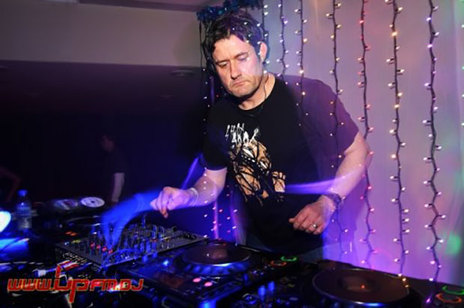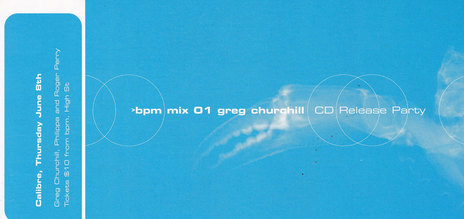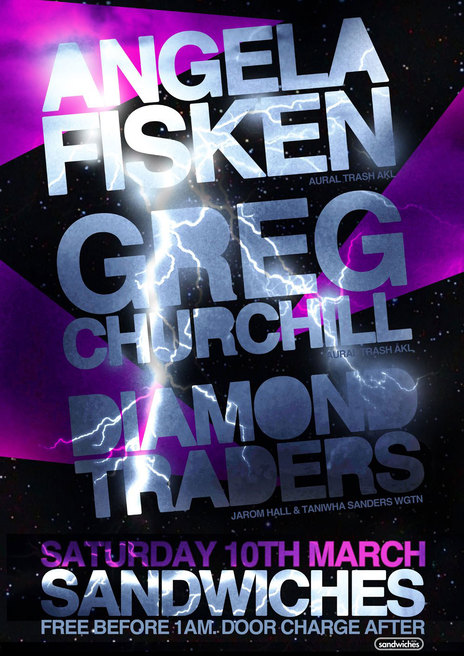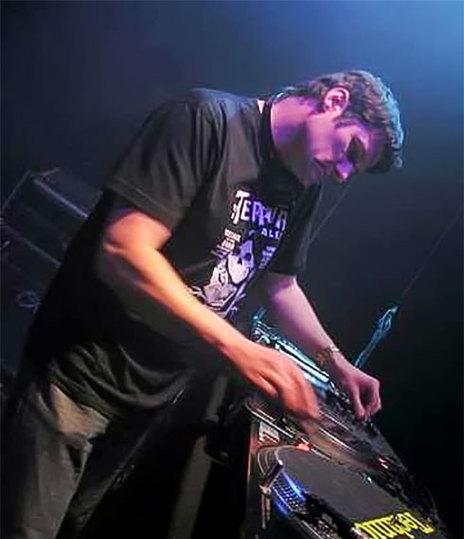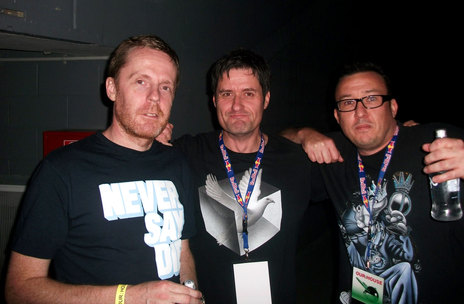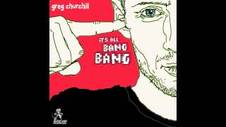It is a rare written, punter’s-eye view of a late-night club dance experience in the early 21st Century in Auckland.
Churchill is our most profound DJ. He has never forgotten the basic dance-function of his music, but he has explored it with intelligence and wide-ranging musical reference. He is the true deep history of New Zealand House both in his club-work and his own recordings and mixes. His residencies and gigs are key elements in any history of clubbing in Auckland. His tours have unified a national scene.
He has never forgotten the basic dance-function of his music, but he has explored it with intelligence and wide-ranging musical reference.
It began in 1984, when Churchill was a Christchurch radio DJ who featured early hip-hop and electro tracks alongside funk, soul and disco, on his regular Friday student-network dance show. A former paperboy, he was at the University of Canterbury majoring in politics, heading towards a Masters.
The radio show soon led to invitations to DJ parties in and around the city. By 1989, Churchill, along with his DJ partner Glenn McKinley, began programming the house music, which was being released in the USA and the UK, to a weekly Christchurch club crowd at Romanov’s.
Romanov’s was oddly international because of its patronage by USA military staff from the Antarctic base. They were mostly from Philadelphia, New Jersey, the North Eastern seaboard states, the home of Paradise Garage and the New York House scenes. They’d ask to DJ. They’d share records.
Churchill and McKinley’s nights at Romanov’s began pulling in upwards of 600 people and they moved to the Worcester Bar (Noah’s) in mid-1990.
Their gigs coincided with the catalyst of the acid house explosion. Churchill had also been in the UK for five months, during the second “Summer of Love” and had experienced it first-hand. He was also swiftly developing a repertoire of skills and discovering the opportunities offered by the availability of new audio equipment and logics.
He picked up beatmixing from Soulmaster Cee, a Christchurch DJ who was previously based in Sydney. Churchill had an Atari and a Roland w30 sampler and he gigged with Hamish Clarke (Breaks Co-Op) and Karaan Tucker (Tucker XL). Among others, they had supported MC OJ and Rhythm Slave.
Simultaneously, a club revolution was occurring in Auckland. Simon Grigg and his business partner Tom Sampson had opened Cause Celebre and The Box at 35 High Street, with DJs Rob Salmon and Manuel Bundy. These two adjoining clubs essentially created a dance audience and would maintain it for eight years with the best local DJs and high calibre touring artists.
Grigg heard Churchill in Christchurch at Noah’s and offered him a residency at The Box. Initially Churchill turned him down, but a week or so later he accepted the offer and the relocation. Churchill joined the line-up in The Box in 1995, taking the club to a “tougher, far more techy” style.
He remained there for the next four years, sometimes working all-night sets, from opening to close at 6am. He was supported first by Dean Webb, then by Rob Warner. It was an era that would come to define the Auckland dance club scene.
“If I ever needed a new lease on life, then The Box provided it.”
— Greg Churchill
“If I ever needed a new lease on life, then The Box provided it,” Churchill said. “I’d never played on a sound-system with so much bass.”
His memories of the Box are vivid: “I still can remember an extremely busy Friday night, when I’d often play the first set, dropping Peace Division’s ‘In Piecez’ … The tune had only come in store that afternoon and the crowd’s reaction to the bassline-drop was simply amazing … I can still picture that very moment and that ‘holy fuck’ reaction I must have had on my face.”
“[The Box] wasn’t the easiest of rooms to work, but when it was rocking, when it was full, few have ever come close,” Churchill comments. “People always remember the good nights, the big nights, but there were an enormous number of tough nights that I felt really tested my spirit, my resolve and ability as a DJ … I’d end up digging myself into a hole and have to slowly work my way out – a process that could take hours – in the hope of ending the night on some sort of high.“
Churchill would support touring DJs at the Box including Stacey Pullen, Derrick May, Jeff Mills, Ritchie Hawtin, Dave Angel and Terry Francis. The Box released the first NZ DJ mix album, by Churchill and Dean Webb, called simply Box, in a metal tin in 1996. It was limited to 1,500 copies and is now highly collectable.
It was a crucial residency for Churchill. It coincided with the peak of New Zealand’s ecstasy years, which would dissolve in the early 2000s with the arrival of BZP and other quasi-legal substitutes. It marked the arrival of the internet and near-instant dissemination of new music. New Zealand magazine Remix would offer free CD DJ sets with its issues, and Churchill’s Remix 4 remains the stand-out. It was the real era of the NZ club DJ, and the Box years gave punters that rare thing, a front-seat position to participate in growth and maturing of an artist.
Churchill was formative in other ways. He had a position at bPM records, a shop in which he’d later become a partner. It gave him unparallelled access to newly-released vinyl on a near-daily basis and record-buyers eager for guidance. He also co-hosted (with Simon Grigg) the long-running Beats Per Minute show on Auckland’s 95bFM, taking over from Grigg's earlier partner in the show, Rob Salmon, in 1995. Initially the show simply took the Box to radio, but soon developed its own identity as a venue for newly released tracks and remixes. It was the premier radio slot for dance music in Auckland, staying on air until 2002 (Grigg had created the show in 1989).
Churchill’s next obvious step was to create his own tracks.
In 1995, he’d aided Dark Tower in gaining a NZ On Air grant, a first real contact with recording and releasing. He’d worked with Simon Holloway at Beaver Studios remixing Jan Hellriegel and TrueBliss. He’d spent studio time with Alan Jansson.
“So I suppose there came a time after 15 years of dabbling and writing hundreds of ideas that I’d finally had the confidence to send something to a label … I was encouraged by Dick Johnson and his association with Bosh, a label in Blackpool.”
In 2003, Bosh released Churchill’s ‘Aside From You’. Then he sent five or six tracks on spec to Underwater’s Darren Emmerson (formerly of UK group Underworld). Within a week, Emmerson had got back to him and a productive partnership was built.
Churchill’s first release for Underwater was ‘Budonkadonk’/‘Body Slam’. With its slow build and expert manipulation of pace, ‘Budonkadonk’ charted at No.91 on the UK Charts in May 2004.
Churchill was only the third NZ-based artist to ever hit the UK charts, alongside OMC and Concord Dawn, and ‘Budonkadonk’ will remain one of the great dance tracks of New Zealand music. It distills Churchill’s essence as a DJ: chunky beat, deft rhythm-pace, the creation of real aural spaces, with a perfect anticipatory sense of climax.
‘Budonkabonk’/‘Body Slam’ was followed by ‘Body Slander’/‘Wrong Sound’ and ‘Infused Trash’/‘Plutonic’. ‘Nola’s Scream’/‘Automatique’ in 2005 was a further cementing of Churchill’s early release career.
“For me, producing has always been more of a struggle than DJing,” he says. “I’ve never wanted to take the easy road. I’ve always wanted to do everything myself with as little assistance as possible from outside engineers and programmers. I’ve tried to never just set up a blueprint and continually write the same idea from track to track.”
Churchill would become the first NZ DJ to release and record on Ministry of Sound (UK) with his 2006 compilation It’s Only A Mixtape which was voted Compilation of the Month by Mixmag magazine. He would eventually have tracks on Toolroom, Great Stuff, Hed Kandi, Azuli, Gung Ho and his own Move To Trash label.
Churchill had an audience, one that would follow him through the first decade of the 21st Century.
Churchill had an audience, one that would follow him through the first decade of the 21st Century. He was synonymous with Auckland clubbing with long-standing gigs in many venues from Ink to Code and much in-between. He was a regular at The Big Day Out performing 1999 to 2003 and in 2005.
“Prior to my first ever gig at BDO, I had never been one to pump a fist, raise a hand in the air,” Churchill said. “For me, I really did prefer the surly, heads-down, serious types. I still do.” He described his wife, Gaelyn, coming up to him two tracks into his first 1999 BDO set and encouraging him to start engaging with the crowd. “She was so spot on the money … 8,000 punters just erupted in front of me.”
In 2001, Churchill completed the entire Australasian BDO leg alongside Carl Cox, Darren Emerson and Roni Size.
But there was a problem, one that he had to face with the success of his UK releases.
“I’ve only just opened up about this,” Churchill says, “but the reason I stopped travelling to the UK – even after I had an agent with European dates all booked – was because I couldn’t face flying long-haul. It’s not a fear of flying but more that claustrophobic sensation of being trapped in a plane for 12 to 15 hours … I’ve only just recently felt like I might be willing to give it another go.”
By the late-2000s, Churchill had been voted NZ DJ of the year six years running. He was doing Masterclasses and Technical Sessions, passing his knowledge on to a new generation, while still playing regularly at venues around New Zealand.
By the late-2000s, Churchill had been voted NZ DJ of the year six years running.
He was also one half of the well-known and commercially successful electro duo, Aural Trash, with Angela Fisken. In 2005, Churchill joined GeorgeFM and co-hosted the Aural Trash radio show with Fisken (the show had debuted earlier in 2004 on 95bFM). They would both tour nationally while releasing more than 36 mix CDs. He would come to devote his production efforts to Aural Trash, shelving his own recordings.
“I’m convinced we worked so well due to the male-female dynamic,” Churchill said. “Our personalities are also very similar ... Our music backgrounds were very similar too, both having played house and then discovering electro/electroclash at the same time.”
Their split in 2013 wasn’t easy or taken lightly, but both DJs had grown apart. Fisken was playing Dutch EDM sounds while Churchill was re-exploring darker tech and house.
Churchill's knowledge and experience is audible when he plays. He’s undeniably influenced every working New Zealand DJ just as he has soundtracked the dance experiences of a clubbing generation.
“… and we are all waiting in anticipation for the drop to come,” van der Velt continues in his description of that 2005 club-night with Churchill, “when we can finally all let go and marvel at the huge glorious bigness that will roll on up to its crest, an immense surge of thisness and thatness and sheer total joy peaking there on the dance-floor …”
